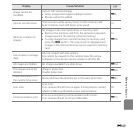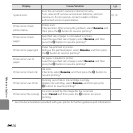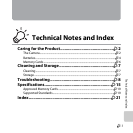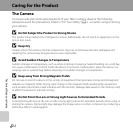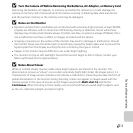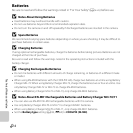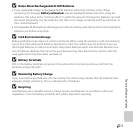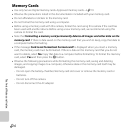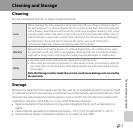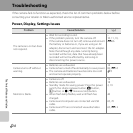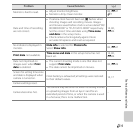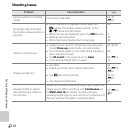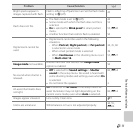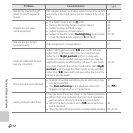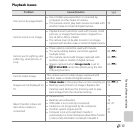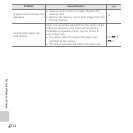
F7
Technical Notes and Index
Cleaning and Storage
Cleaning
Do not use alcohol, thinner, or other volatile chemicals.
Storage
Remove the batteries if the camera will not be used for an extended period. To prevent mold
or malfunction and to ensure long, trouble-free use of the camera, we recommend you insert
the batteries and operate the camera approx. once a month. Do not store the camera with
naphtha or camphor moth balls, or in any of the following locations:
• Next to equipment that produces strong electromagnetic fields, such as televisions or
radios
• Places that are exposed to temperatures below –10 °C (14 °F) or above 50 °C (122 °F)
• Places that are poorly ventilated or subject to humidity of over 60%
Lens
When cleaning the lens, avoid touching it directly with your fingers. Remove dust or
lint with a blower. To remove fingerprints, oil, or other grime that cannot be removed
with a blower, wipe the lens with a soft, dry cloth or an eyeglass cleaning cloth, using
a gentle spiral motion that starts in the center and moves toward the edges. Do not
wipe forcefully or wipe with a rough cloth, otherwise the camera may be damaged
or malfunction. If you still cannot remove the grime, wet a soft cloth with a
commercial liquid lens cleaner and gently wipe off the grime.
Monitor
Remove dust or lint with a blower. To remove fingerprints, oil, or other grime, wipe
the area with a soft, dry cloth or an eyeglass cleaning cloth. Do not wipe forcefully or
wipe with a rough cloth, otherwise the camera may be damaged or malfunction.
Body
• Remove dust or lint with a blower. Wipe with a soft, dry cloth.
• After using the camera at the beach or other sandy or dusty environment, wipe off
any sand, dust, or salt with a dry cloth lightly dampened with fresh water and dry
thoroughly.
Note that foreign matter inside the camera could cause damage not covered by
the warranty.



